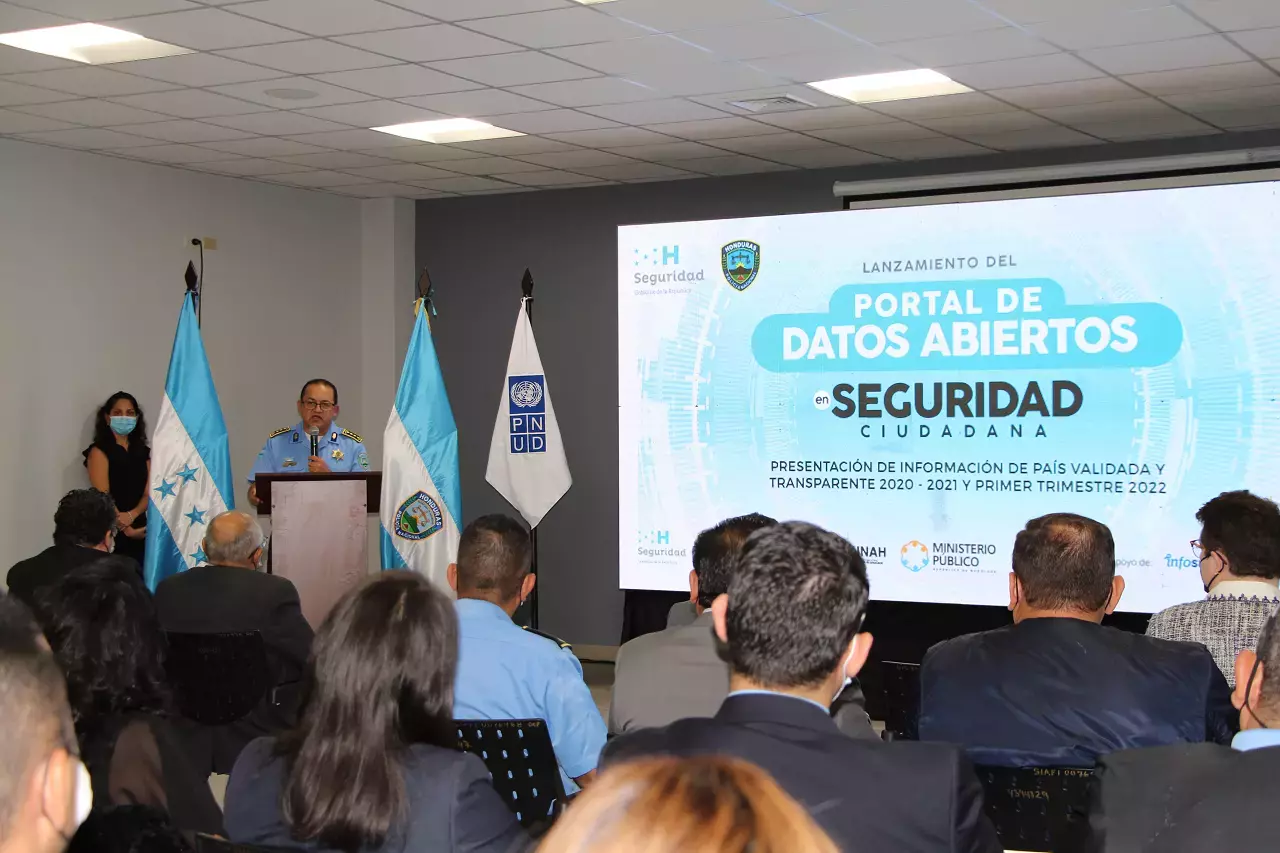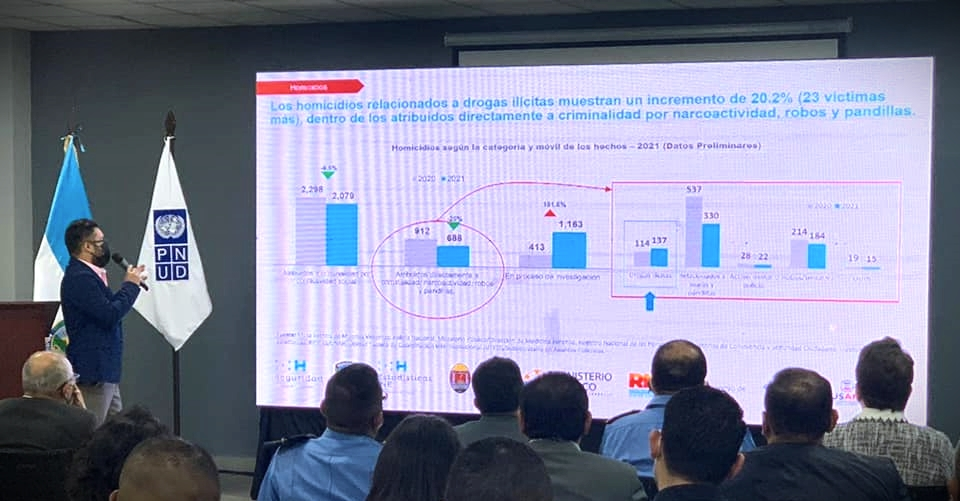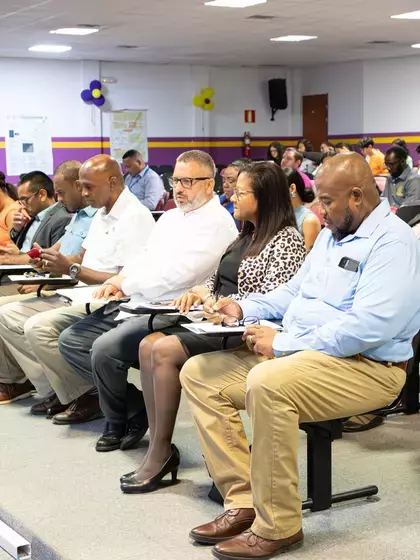Open Data Portal: New consolidated integrated system of citizen security figures available to the public

- A new open data system to analyse indicators of violence, insecurity and risk factors in 298 municipalities around the country, facilitating evidence-based citizen security policymaking and implementation
- Click on hyperlink to access the Secretariat for Security data system: seguridaddatosabiertos.gob.hn
A new integrated data system on citizen security, the Integrated Information System for Coexistence and Citizen Security Policies was launched today by the Secretariat for Security. Validated figures on crimes against life and incidents of violence are made publicly available, strengthening transparency and access to public information in Honduras.
The information will be accessible on the portal www.seguridaddatosabiertos.gob.hn where users can view objective data validated by public agencies, with oversight by academia: Secretariat for Security (SEDS), Public Ministry (MP), Secretariat for Education, National Statistics Institute (INE), National Registry of Persons (RNP), National Anti-Extortion and Anti-Gang Force and the oversight office of the Violence Observatory – IUDPAS/National Autonomous University of Honduras.
The Integrated System emerges from the coordination of the above-mentioned institutions and the technical support of the InfoSegura Project of the United Nations Development Programme (UNDP) with the support of the United States Agency for International Development (USAID). This system is also generally expected to promote citizen security policy design and implementation that is evidence-based and gender-responsive.
The system consolidates, classifies and analyzes information on 12 indicators: Homicide, sexual crime, injury, abuse, kidnapping, domestic violence, intra-family violence, extortion, theft, robbery including vehicle and motorcycle robbery and theft, teenage pregnancy, returned migrant, road traffic death and suicide. The database combines more than 600,000 records since 2013, disaggregated by sex, age and geographical area, among other items that make it possible to run analysis on national security. It will also help improve crime neutralization strategies.
Collective work, beyond media monitoring
The importance of having a process for reaching consensus on data is that in the end there is an official figure, not limited to media monitoring, rather, each piece of data or recorded criminal instance has undergone a validation process involving all the competent agencies, and there is a single point of reference. Data must be factual, objective and transparent, contributing to efficient coordination that enables institutions to work out strategies to reduce violence overall, and in turn, strengthen the credibility of the institutions, which has an impact on the process of strengthening the rule of law.

During the event, verified data on the incidence of violence for 2020, 2021 and preliminary data for the first quarter of 2022 were presented.
Data for 2021 reveals that the country is experiencing an increase in the majority of criminal incidents. In 2021, the annual homicide rate was 41.6 per 100,000 population, slightly higher than in 2020, but lower than previous years except 2018. The discontinuous variations in the trend suggest that there is a need to improve the effectiveness of violence-reduction policies, and in particular, homicidal violence and violence against women and girls.
Furthermore, in 2021, male homicides increased by 9.2% (303 more victims), while female homicides increased by 0.6%. Ninety-two per cent of homicide victims were males between the ages of 18 and 30 (40.2% of total victims), despite an overall decrease in this group (38 fewer victims compared to 2020).
That year, there was an increase in other violent events besides homicide. Traffic-related fatalities increased 36.2% compared to the previous year (463 more victims), suicides increased 36.7% (150 more victims) and sexual crimes increased 51.6% (1,269 more reports) with women accounting for 85.5% of all instances, and more than half of these (54.4%) were girls and adolescent women under 18 years of age.
Conversely, preliminary data from January to March 2022 shows a decrease of 5.2% in the number of homicides (51 fewer victims) compared to the same period in 2021. Male homicides decreased by 4.2% (37 fewer victims), and there was a 14.4% decline in female homicides (13 fewer victims).

"With the increase in violence we all lose out. But in order to take corrective actions in the face of a multidimensional problem, we need to know the real and validated data of what is happening, and improve police investigation with scientific evidence. The validated data provides a view of what is happening in the country, and shows the need to work inter-institutionally to eradicate violence. A contribution to this end is the new integrated data system for authorities and other decision makers to take the pertinent measures based on evidence that informs public policy," said Vice Minister of Security Julissa Villanueva, who promotes this initiative together with foreign aid organizations. She also noted that the Subsecretariat for Police Affairs is generating quality, scientific evidence-based information for decision-making at institutional and inter-institutional levels, and is promoting the adoption and rigorous application of action protocols, scientific method and standardized mechanisms in institutional operations. This way Citizen Coexistence and Security Observatories are being strengthened in strategic municipalities. Moreover, inter-institutional strategic alliances are being consolidated in pursuit of common objectives, and efforts are being made to obtain financing and find sources of aid to strengthen institutions, and to generate public value (professional and quality police service).

For her part, UNDP Deputy Resident Representative Rose Diegues said, "over the past five years together we have contributed with USAID to work on strengthening the entire information management chain and use of data in public safety and justice policies. We are currently working on digital tools to support the production of official data, so that they are freely accessible. This system will facilitate data exchange and traceability and make processes more agile. Our institutional strengthening efforts are collective. In addition to supporting the Secretariat for Security, we work with other agencies that are also part of the violence response and prevention efforts, supporting them in inter-institutional coordination and improving the quality of data and information analysis."
The data validated to date are available on the website: Integrated Information System for Policies of Coexistence and Citizen Security www.seguridadatosabiertos.gob.hn. So is the 2022 information verified by all the responsible entities and fieldwork of the technicians of the Technical Inter-Institutional Coordination Unit (UTECI).
These efforts aim to enhance the processes of evidence production for citizen security management, by strengthening the Secretariat for Security in the actions of coordination, institutional cooperation, interoperability and implementation of digital solutions that facilitate access and promote transparency for citizens.






